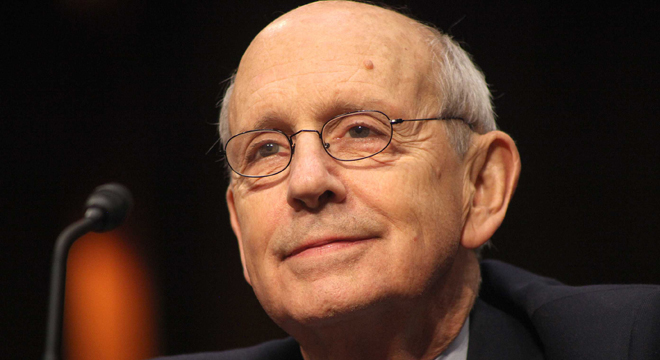The Obama administration’s top legal advocate was pilloried Tuesday for offering a less-than-eloquent constitutional defense of the health care reform law’s individual mandate — the provision at the heart of the challenge to “Obamacare.” Thankfully for supporters of the law, some of the sharpest legal minds in the country unintentionally articulated his case better than he did — the justices themselves. Liberal-leaning justices on the court each stepped in at various points to suggest arguments for the mandate’s legitimacy.
Here are the four best arguments they made — or at least hinted at — that could sway their skeptical colleagues.
Justice Stephen Breyer
The most emphatic defense of an individual mandate came from Justice Stephen Breyer, who several times raised the question of whether Congress may mandate that everyone who has a fatal, communicable disease be inoculated. “A disease is sweeping the United States,” he said, “and 40 million people are susceptible, of whom 10 million will die; can’t the federal government say all 40 million get inoculation?”
Then Breyer explained the principle behind the argument.
“It shows there is a national problem, and it shows there is a national problem that involves money, cost insurance,” he said. “So if Congress could do this, should there be a disease that strikes the United States and they want everyone inoculated even though 10 million will be hurt, it’s hard for me to decide why that isn’t interstate commerce, even more so where we know it affects everybody.”
Breyer returned to the hypothetical several times when the two lawyers for the law’s challengers cried foul on the government’s ability to mandate the purchase of a product.
Justice Ruth Bader Ginsburg
When U.S. Solicitor General Donald Verrilli made a vague case for regulating economic activity, Justice Ruth Bader Ginsburg needled him to get more specific about why it’s necessary here — and effectively made his case for him.
“I thought what was unique about this,” she said, “is it’s not my choice whether I want to buy a product to keep me healthy, but the cost that I am forcing on other people if I don’t buy the product sooner rather than later.”
Ginsburg interjected again when Justice Antonin Scalia grilled Verrilli on whether government can require people to purchase cars if the insurance mandate is upheld.
“I thought a major, major point of your argument was that the people who don’t participate in this market are making it much more expensive for the people who do,” she said.
He agreed: “That absolutely is a justification for Congress’ action here.”
Justice Sonia Sotomayor
The Obama-appointed Justice Sonia Sotomayor succinctly summed up the need to require everyone to be insured: Everyone will need care at some point. “Virtually everyone, absent some intervention from above — meaning that someone’s life will be cut short in a fatal way — virtually everyone will use health care,” she said.
Invoking a prior Supreme Court decision, Sotomayor said, “the power to regulate, the power like all others vested in Congress is complete in itself, may be exercised to its utmost extent.” She added that “there is no conscription … set forth in the Constitution with respect to regulating commerce.”
Later, she said: “There is government compulsion in almost every economic decision because the government regulates so much. It’s a condition of life that some may rail against, but…”
Justice Elena Kagan
Justice Elena Kagan, herself a former solicitor general, called out the GOP lawyer Paul Clement’s contention that not everyone is in the health insurance market and that the government wants to force them into it.
“Well, doesn’t that seem a little bit, Mr. Clement, cutting the bologna thin?” she said. “I mean, health insurance exists only for the purpose of financing health care. The two are inextricably interlinked. We don’t get insurance so that we can stare at our insurance certificate. We get it so that we can go and access health care.”
When Verrilli began invoking hypotheticals about commerce power, Kagan stepped in with a rhetorical question about why requiring the purchase of insurance is ultimately about broad well-being as opposed to some people subsidizing others.
“And this is especially true, isn’t it, General Verrilli, because in this context, the subsidizers eventually become the subsidized?” she asked.
Verrilli sounded thankful: “Well, that was the point I was trying to make, Justice Kagan.”










